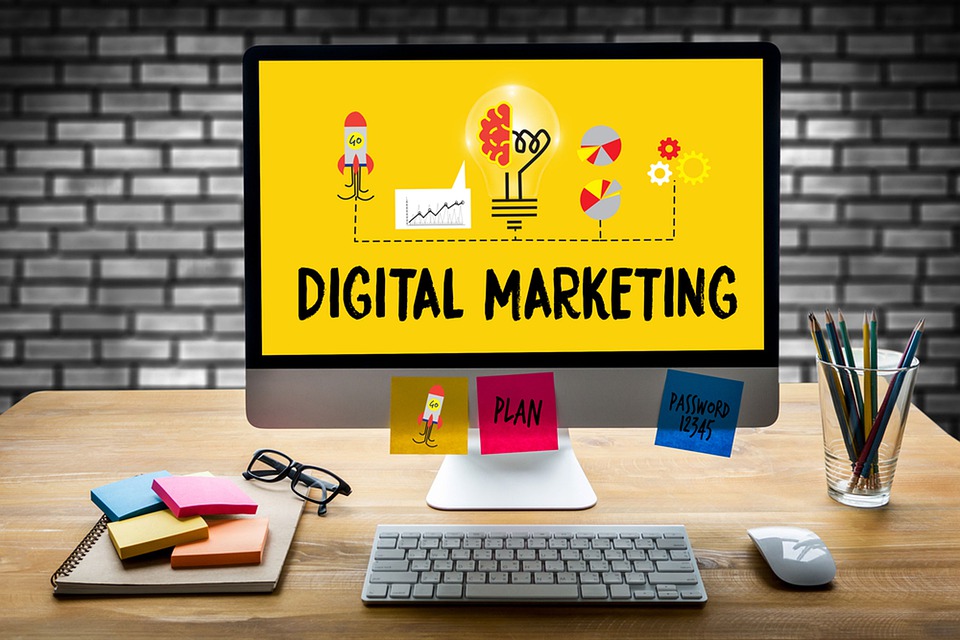Digital marketing enables growth and innovation in today’s highly dynamic business world. As such, it is essential for start-ups and well-established multinationals, preferably and necessarily for survival in a highly dynamic and faceted world.
Advantages of Digital Marketing
Digital business solutions are technologies and strategies to make business processes more efficient and support an organization’s strategic objectives. These solutions are digital-platform-based, powered by advanced analytics and automation for more efficient organizational functions.
Data-driven Insights
Real-time data analysis is a great advantage of going digital because it helps make informed decisions and deliver rapid responses to market changes. Great insights into customers’ behaviors and trends could enable enterprises to make proper decisions and enhance their products and services. Due to the growing reliance on technology, many businesses must get involved to remain relevant in the market and achieve long-term gains.
Scale and flexibility
A digital marketing agency can attain scalability and flexibility through big-data prompts that businesses can quickly and efficiently analyze.
Therefore, scalable digital infrastructure and cloud computing help businesses react in real-time to market situations and scale up resources as needed.
Flexibility reduces the need for capital expenditure on complex infrastructures and reinforces business growth and operational scalability. Digital marketing enables business agility through quick and innovative initiatives, reacting to market dynamics, or needing to take advantage of new opportunities.
Challenges and Considerations
However, well-structured success in digital transformation comes only with proper planning, strategic alignment with the business goals, and robust cybersecurity. Therefore, businesses must pay attention to their data security and other associated activities, which are conducive to optimizing the leverage potentials within digital technologies and transformation for a competitive edge and reducing associated business risks.
Enhanced Decision Making
Digital technologies enable businesses to change by increasing efficiencies and faster decision-making. Digital transformation makes companies remain innovative and adapt to market dynamics to sustain competitive advantages in the digital era. This way, organizations will be best able to cope in a business environment full of complexities, capture massive growth potential, and try to prosper amid uncertainties in this environment of rapid change.
Improved Customer Experience
One of the significant prospects of digital technology offered to modern businesses is that it facilitates operations, increases efficiency, and improves customers’ experiences. In today’s fast-paced world of technology, businesses or any digital marketing agency need to embrace innovative solutions to be on the front line with competitors and meet customers’ ever-changing needs.
Cost-Effectiveness
Using the latest technology helps automate business tasks, manage and maintain business information, and provide better access to a wide range of audiences. It provides a sustainable platform for most companies to save on resources and let the profit margin stretch. The business must aim for sustained growth and an edge over its competitors.
Enhanced Resources
Automation tools play a vital role in decreasing manual tasks and improving work. With easy-to-follow repetitive procedures, companies can maximize resource utilization and allow employees to focus only on high-value activities. Besides, integrating digital platforms ensures efficient data flow and effective department communication without glitches.
Disadvantages of Digital Marketing
Digital marketing is necessary for any business to reach and engage its target markets. While digital marketing has numerous advantages, it also has some disadvantages. It gives insight into the challenges businesses face in the digital divide.
Ad Fatigue and Information Overload
There is quite simply no room left in the digital sphere, and people and consumers are content on all sides. Many marketing messages are directed at many users daily, eventually leading to ad fatigue and diminished engagement. The overload of information has also made it progressively difficult for any business to make itself known or attract an audience, supposedly making the efforts of a digital marketing campaign worthless.
Constant Algorithm Changes
Search engines and social media have ever-changing algorithms and changes that create massive effects on a company’s visibility online, which will consequently affect its new reach. Most of the time, such changes make it necessary to adapt strategies within the business, raising investment in time and resources. It’s hard to keep it updated on algorithm updates and sometimes leads to time depression in traffic or engagement if it’s not carefully managed.
Negative Feedback and Reputation Management
One’s reaction to a brand is better seen when everything is posted in real time, including negative feedback. One post, one bad review or comment, and it can go viral, all to the detriment of a brand. Online reputation management becomes a constant challenge, and businesses must keep on the lookout and respond to customers’ concerns on every platform.
Privacy Concerns and Data Security
Digital marketing’s rampant need for data collection and analysis raises major privacy concerns. As users become aware of illegal data breaches and the use of personal information, they will become wary. Such wariness usually results in low engagement with marketing campaigns, making it hard to collect valuable consumer information.
Technical Problems and Downtime
Technical problems and system crashes may threaten digital marketing campaigns. Website crashes, broken links, or unresponsive ads can lead to missed opportunities and upset customers. Technical glitches are costly during significant marketing periods, such as product launches, when significant investments are made.
The dynamism of digital platforms is so high that any information can quickly become stale. Therefore, businesses have to keep up by providing fresh and up-to-date information that matches their audience’s interests, and this can consume a lot of resources and time. The unending pressure to deliver new content can overstretch the resources of your creative team and marketing budget.
Difficult to Measure ROI
Even though digital marketing provides several metrics and analytic tools, measuring the return on investment with certainty can sometimes be a big challenge. Most attribution models are quite complex, and the exact marketing efforts leading to conversions are hard to establish. The uncertainty may complicate work on budget and strategy optimization.
As more businesses recognize the importance of digital marketing, the competition for online visibility intensifies. The increased competition often leads to rising costs for paid advertising campaigns, such as pay-per-click. Small businesses with limited budgets may need help to compete effectively against more giant corporations with deeper pockets.
Dependence on Technology
Digital marketing’s reliance on technology makes it vulnerable to technology failure or change. A sudden policy change by an app or critical tool going out of the market can disrupt whole marketing strategies and mean drastic changes, even leading to setbacks.
Lack of a Personal Touch
While digital marketing can be personalized to a great extent, it usually lacks the human touch compared to traditional marketing. Establishing sincere relations with customers through digital marketing can be challenging, which may also reduce brand loyalty and emotional commitment.
These come with as many shortcomings in the process; for example, the business has to be tuned to and pinpoint the deficiencies and roadblocks in such a way that a balanced and wholesome marketing strategy is built, one that effectively neutralizes the risks while complementing the unique perks offered by digital marketing. Only then will such businesses be able to properly exploit these opportunities and overcome challenges that lie in the way to succeeding in a much-competitive online environment.
Digital marketing is fundamental and provides companies with ways to target audiences and promote brands. The use of digital approaches will appeal to and engage the desired market for business insight and increase long-term value success.


Pingback: How Digital Marketing Can Help Your Business Post-Pandemic